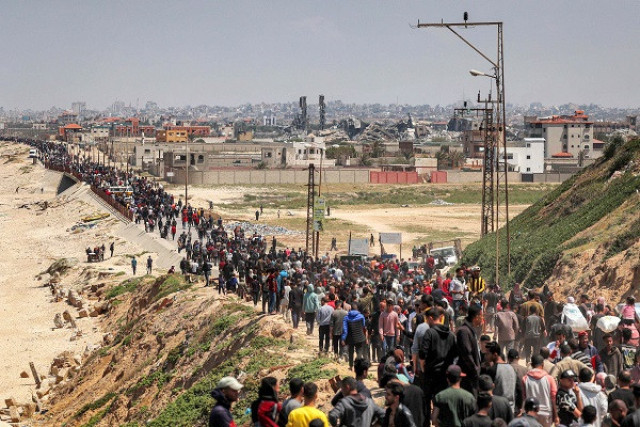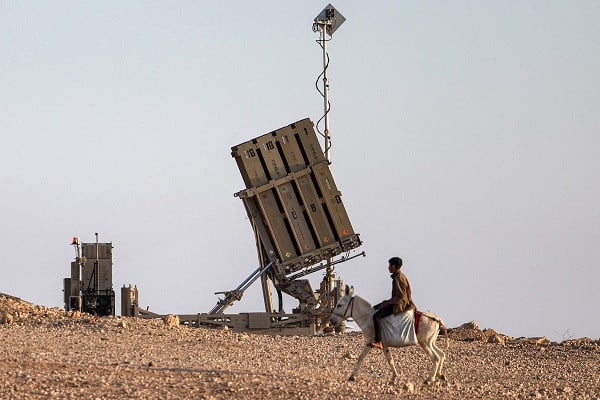Israel vows to press on in Gaza after Iran attack
Israeli army 'calling up approximately two reserve brigades for operational activities on Gazan front'

Israel launched dozens of air strikes onthe besieged Palestinian enclave of Gaza overnight, Hamas said Monday, as the Israeli army said it will not be distracted from the war after Iran's retaliatory attack heightened fears of a wider conflict.
World powers have urged restraint after Iran late Saturday launched more than 300 drones and missiles at Israel, though the Israeli military has claimed the vast majority were intercepted.
Tehran's first direct assault on Israel, in retaliation for a deadly strike in Damascus earlier this month, followed months of violence across the region involving Iranian-supported groups who say they act in support of Palestinians in the war-battered Gaza.
"Even while under attack from Iran, we have not lost sight, not for one moment, of our critical mission in Gaza to rescue our hostages from the hands of Iran's proxy Hamas," Israeli military spokesman Rear Admiral Daniel Hagari said late Sunday.
As mediators eye a deal to halt the fighting fears grew over Israeli plans to send troops into Rafah, a far-southern city where the majority of Gaza's 2.4 million people have taken refuge.
"Hamas is still holding our hostages in Gaza," Hagari said of the roughly 130 people, including 34 presumed dead, who Israel says remain in the hands of Palestinian resistance fighters.
"We also have hostages in Rafah, and we will do everything we can to bring them back home," the military spokesman told a briefing.
The army said it was "calling up approximately two reserve brigades for operational activities on the Gazan front", about a week after withdrawing most ground troops from the territory.
The Hamas government media office said Israeli aircraft launched "dozens" of strikes overnight on central Gaza.
Rumours of a reopened Israeli checkpoint on the coastal road from the besieged territory's south to Gaza City sent thousands of Palestinians heading north on Sunday, despite Israel denying it was open.
An AFP journalist saw mothers holding their children's hands and families piling onto donkey carts with their luggage as they made the journey.
Hoping to reunite with his wife who has been in the southern city of Khan Yunis, Palestinian man Mahmoud Awdeh said, "she told me over the phone that people are leaving... she's waiting at the checkpoint until the army agrees to let her head to the north".
The Israeli army however told AFP that reports the route was open were "not true".
The UN Security Council held an emergency meeting Sunday following the Iranian attack, where Israel pressed for new sanctions against Tehran and Secretary-General Antonio Guterres warned the region was "on the brink" of war.
"Neither the region nor the world can afford more war," the UN chief said. "Now is the time to defuse and de-escalate."

A boy rides a donkey near one of the batteries of Israel's Iron Dome missile defence system at a village not recognised by Israeli authorities in the southern Negev desert. PHOTO: AFP
Iran's UN envoy, Amir Saeid Iravani, insisted the Islamic republic was exercising its "inherent right to self-defence" to respond to the April 1 strike on Terhan's consular building in Damascus which has been widely attributed to Israel.
He insisted Iran did "not seek escalation or war".
In his briefing, Hagari said Israel was "still on high alert and assessing the situation".
G7 leaders also condemned Iran's attack and called for "restraint" on all sides, European Council President Charles Michel wrote on X after a video conference on Sunday.
"Ending the crisis in Gaza as soon as possible, notably through an immediate ceasefire, will make a difference," he said.
Israel's top ally the United States also urged caution and calm.
"We don't want to see this escalate," White House National Security Council spokesman John Kirby told NBC.
After the attack, Joe Biden reaffirmed the United States' "ironclad" support for Israel, but a senior US official said the president had also told Israeli Prime Minister Benjamin Netanyahu that Washington would not offer military support for any retaliation on Iran.
Iranian President Ebrahim Raisi on Sunday cautioned Israel against a "reckless" retaliation, warning it would spark "a decisive and much stronger response".
Word of the impending attack prompted Israel to close schools and announce restrictions on public gatherings, with the army saying early Monday that those measures were being lifted for most of the country.
Hostilities between Israel and Iran's regional allies have flared since the outbreak of the war in Gaza.
Israel's brutal offensive has killed at least 33,729 people in Gaza, mostly women and children, according to the territory's health ministry.
Attempting the journey back to northern Gaza, displaced resident Basma Salman said, "even if it (my house) was destroyed, I want to go there. I couldn't stay in the south."
"It's overcrowded. We couldn't even take a fresh breath of air there. It was completely terrible."
Late Saturday, Hamas said it had submitted its response to a truce plan presented by US, Qatari and Egyptian mediators at talks that started in Cairo on April 7.
Hamas said it was sticking to its previous demands, insisting on "a permanent ceasefire" and the withdrawal of the Israeli army.
Israel's Mossad spy agency called this a rejection of the proposal, accusing Hamas of "continuing to exploit the tension with Iran" and aiming for "a general escalation in the region".
However, the United States said mediation efforts continue.
"We're not considering diplomacy dead there," said the National Security Council's Kirby.
"There's a new deal on the table... It is a good deal" that would see some hostages released, fighting halted and more humanitarian relief into Gaza, Kirby said.



















COMMENTS
Comments are moderated and generally will be posted if they are on-topic and not abusive.
For more information, please see our Comments FAQ